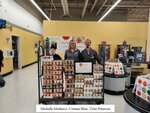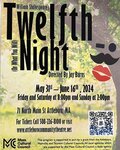Special Event Showcases African American Food Traditions in Rhode Island
Providence, RI – A special food-tasting and lecture is planned following the sold out opening of “Creative Survival: African American Foodways in Rhode Island.” The Thursday, November 3, 2011 event at 5:30pm at Johnson and Wales’ Culinary Arts Museum, 315 Harborside Blvd., Providence, RI, features a talk by guest curator Robb Dimmick on Newport Black caterer George T. Downing; samplings from the best Black restaurants in Rhode Island; and a viewing of the landmark exhibit. Funded by the Rhode Island Council for the Humanities (RICH), the event is free and open to the public; reservations are required and may be made by calling: (401) 598-2805.
The exhibit explores the never-before-told story of African American cooking in Rhode Island from South County plantations to colonial East Side farms, from church suppers to soul food restaurants. It showcases the ingenuity of Black food in slavery, survival and celebration. Starting in the early 18th century, the exhibit delves into the complicated relationship of food to slavery, South County plantations’ reliance on slave labor, which produced the nation’s most coveted cheese, and how one South County slave, Phillis, perfected Rhode Island’s most iconic food, the jonnycake. Newport’s Charity “Duchess” Quamino, a slave, was the state’s most esteemed pastry chef, serving delicacies to George Washington. The first restaurant ever opened in Providence was owned by freed slave, Emmanuel Manna Bernoon in 1736. Both Quamino and Bernoon hold esteemed positions in the annals of America’s Black entrepreneurialism. The exhibit’s 19th century highlights include Providence Black vendors hawking food to wealthy East Siders; the eating habits of Snowtown residents shown through archeological artifacts from this historically Black neighborhood; the rituals that food played in churches and fraternal organizations; George T. Downing, Newport’s and the nation’s most successful oyster purveyor; and Black inventors William Purdy & Leonard Peters, whose recently discovered Frederick Douglass sterling silver souvenir spoon will be seen for the first time. Also included is a rich history of 20th century Black restaurants in Providence & Newport. “These untold stories of ambition fraught with economic challenges and culinary triumphs,” says Robb Dimmick, exhibit curator, “will enrich viewers and reveal how extraordinary creativity became the substance, survival and success of the Rhode Island Black community and influenced the nation.”
The exhibit remains open to the public through March 4, 2012 at Johnson and Wales’ renowned Culinary Arts Museum, Tuesday – Sunday, 10:00 A.M. - 5:00 P.M. (401) 598-2805.















Comments
No comments on this item Please log in to comment by clicking here